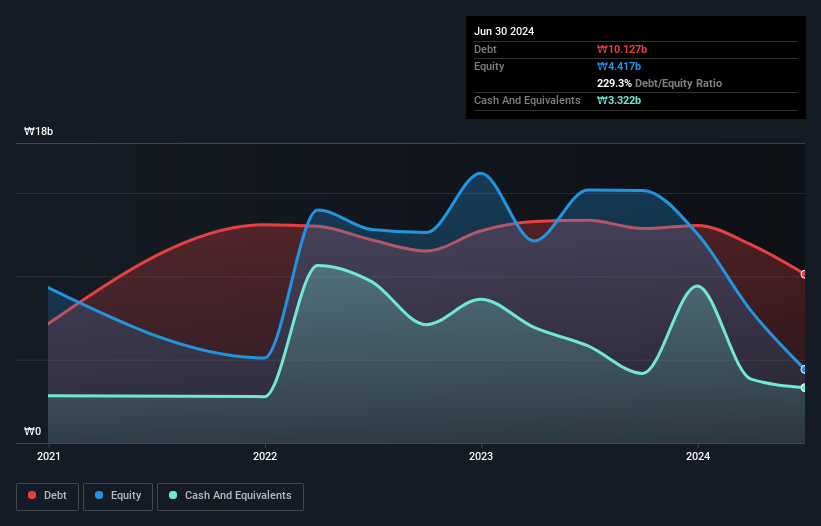
Some say volatility, rather than debt, is the best way to think about risk as an investor, but Warren Buffett famously said that 'Volatility is far from synonymous with risk.' When we think about how risky a company is, we always like to look at its use of debt, since debt overload can lead to ruin. Importantly, ADBiotech Co., Ltd. (KOSDAQ:179530) does carry debt. But is this debt a concern to shareholders?
Why Does Debt Bring Risk?
Generally speaking, debt only becomes a real problem when a company can't easily pay it off, either by raising capital or with its own cash flow. If things get really bad, the lenders can take control of the business. However, a more usual (but still expensive) situation is where a company must dilute shareholders at a cheap share price simply to get debt under control. By replacing dilution, though, debt can be an extremely good tool for businesses that need capital to invest in growth at high rates of return. When we think about a company's use of debt, we first look at cash and debt together.
View our latest analysis for ADBiotech
What Is ADBiotech's Debt?
You can click the graphic below for the historical numbers, but it shows that ADBiotech had ₩10.1b of debt in June 2024, down from ₩13.4b, one year before. However, because it has a cash reserve of ₩3.32b, its net debt is less, at about ₩6.81b.

How Healthy Is ADBiotech's Balance Sheet?
According to the last reported balance sheet, ADBiotech had liabilities of ₩13.6b due within 12 months, and liabilities of ₩4.02b due beyond 12 months. On the other hand, it had cash of ₩3.32b and ₩1.52b worth of receivables due within a year. So it has liabilities totalling ₩12.8b more than its cash and near-term receivables, combined.
While this might seem like a lot, it is not so bad since ADBiotech has a market capitalization of ₩34.3b, and so it could probably strengthen its balance sheet by raising capital if it needed to. However, it is still worthwhile taking a close look at its ability to pay off debt. There's no doubt that we learn most about debt from the balance sheet. But you can't view debt in total isolation; since ADBiotech will need earnings to service that debt. So if you're keen to discover more about its earnings, it might be worth checking out this graph of its long term earnings trend.
In the last year ADBiotech wasn't profitable at an EBIT level, but managed to grow its revenue by 2.3%, to ₩9.8b. That rate of growth is a bit slow for our taste, but it takes all types to make a world.
Caveat Emptor
Over the last twelve months ADBiotech produced an earnings before interest and tax (EBIT) loss. Its EBIT loss was a whopping ₩4.5b. Considering that alongside the liabilities mentioned above does not give us much confidence that company should be using so much debt. Quite frankly we think the balance sheet is far from match-fit, although it could be improved with time. For example, we would not want to see a repeat of last year's loss of ₩8.3b. So we do think this stock is quite risky. There's no doubt that we learn most about debt from the balance sheet. But ultimately, every company can contain risks that exist outside of the balance sheet. For instance, we've identified 2 warning signs for ADBiotech that you should be aware of.
Of course, if you're the type of investor who prefers buying stocks without the burden of debt, then don't hesitate to discover our exclusive list of net cash growth stocks, today.
New: Manage All Your Stock Portfolios in One Place
We've created the ultimate portfolio companion for stock investors, and it's free.
• Connect an unlimited number of Portfolios and see your total in one currency
• Be alerted to new Warning Signs or Risks via email or mobile
• Track the Fair Value of your stocks
Have feedback on this article? Concerned about the content? Get in touch with us directly. Alternatively, email editorial-team (at) simplywallst.com.
This article by Simply Wall St is general in nature. We provide commentary based on historical data and analyst forecasts only using an unbiased methodology and our articles are not intended to be financial advice. It does not constitute a recommendation to buy or sell any stock, and does not take account of your objectives, or your financial situation. We aim to bring you long-term focused analysis driven by fundamental data. Note that our analysis may not factor in the latest price-sensitive company announcements or qualitative material. Simply Wall St has no position in any stocks mentioned.
About KOSDAQ:A179530
ADBiotech
Develops and sells antibodies for livestock, fisheries, and humans in South Korea and internationally.
Slight with mediocre balance sheet.
Market Insights
Community Narratives




